
Erebia epistygne, the spring ringlet, is a species of butterfly in the family Nymphalidae. It is found in France and Spain. Its natural habitat is temperate grassland.
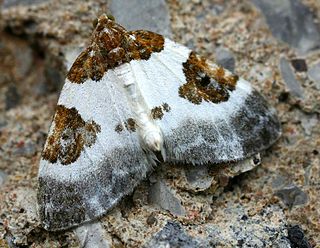
Plemyria rubiginata, the blue-bordered carpet, is a moth of the family Geometridae found in Europe and across the Palearctic. The moth was first described by the Austrian lepidopterists Michael Denis and Ignaz Schiffermüller in 1775.

Trichopteryx polycommata, the barred tooth-striped, is a moth of the family Geometridae. The species was first described by Michael Denis and Ignaz Schiffermüller in 1775. It is found in Europe and the Near East, east to the Caucasus, Transcaucasia, the southern Russian Far East (Primorsk) and Japan (Hokkaido).

Cosmopterix lespedezae is a moth of the family Cosmopterigidae. It is known from the United States.

Cosmopterix montisella is a moth of the family Cosmopterigidae. It is known from the United States, where it is found from New York and Oregon south to New Mexico, Arizona and California. Single specimens have been collected in Arkansas and Iowa. The species is now also established in Michigan.

Cosmopterix pulchrimella, the beautiful cosmopterix moth, is a moth of the family Cosmopterigidae. It is known from the United States and Canada. It is also present in the Palearctic realm, where it is known from the Mediterranean Basin, from Portugal to the western Transcaucasus, north to Switzerland and Hungary. It has also been recorded from the Azores, the Canary Islands and Madeira. It has recently been found in southern England.

Acraea jodutta, the jodutta acraea, is a butterfly in the family Nymphalidae. It is found in Guinea, Sierra Leone, Liberia, Ivory Coast, Ghana, Togo, Nigeria, Cameroon, Equatorial Guinea, São Tomé and Príncipe, Gabon, the Republic of the Congo, the Central African Republic, Angola, the Democratic Republic of the Congo, Sudan, Uganda, Kenya and Ethiopia.

Epicephala microcarpa is a moth of the family Gracillariidae first described by Hou-Hun Li in 2015. It is found in the Chinese regions of Guangxi and Hainan and in Mumbai, India.
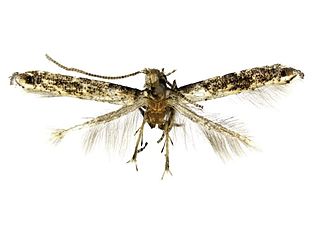
Epicephala laeviclada is a moth of the family Gracillariidae first described by Hou-Hun Li in 2015. It is found in the Chinese provinces of Guangxi and Hainan.
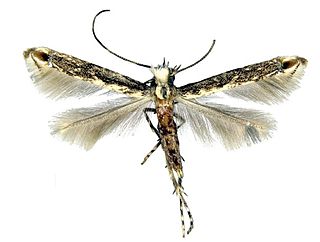
Epicephala tertiaria is a moth of the family Gracillariidae first described by Hou-Hun Li in 2015. It is found in the Chinese provinces of Guangdong and Guangxi.

Epicephala domina is a moth of the family Gracillariidae. It is found in China (Hainan).

Epicephala impolliniferens is a moth of the family Gracillariidae. It is found in China (Hainan).
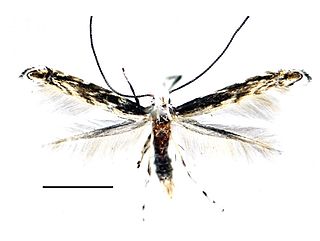
Epicephala camurella is a moth of the family Gracillariidae. It is found in China (Hainan).

Epicephala angustisaccula is a moth of the family Gracillariidae. It is found in China (Hainan).
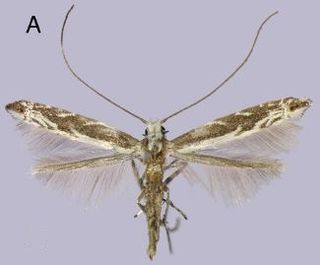
Epicephala anthophilia is a moth of the family Gracillariidae. It is found on a few islands with high elevation in the Ryukyu Archipelago (Amami Island and Okinawa Island). The host plant, Glochidion acuminatum is distributed throughout Southeast Asia from southern Japan to India, so this species is likely to be found in other parts of the host plant's range.

Epicephala lanceolatella is a moth of the family Gracillariidae. It is found on the Ryukyu Archipelago.

Epicephala perplexa is a moth of the family Gracillariidae. It is found on the Ryukyu Archipelago.
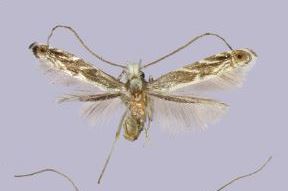
Epicephala obovatella is a moth of the family Gracillariidae. It is found in the warm temperate to subtropical regions of Japan and in Taiwan.
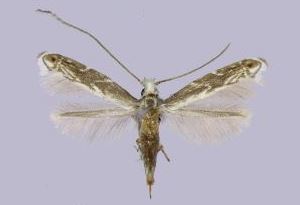
Epicephala corruptrix is a moth of the family Gracillariidae. It is found on the Ryukyu Archipelago.
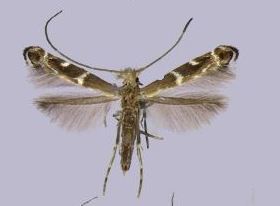
Epicephala anthophilia is a moth of the family Gracillariidae. It is found on the Ryukyu Archipelago.













